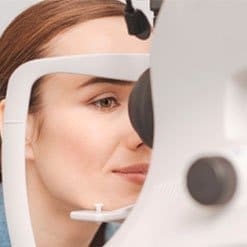Cornea cone correction
Table of Content
Keratoconus
Keratoconus is a progressive cornea dystrophy resulting from inborn metabolic disorders.
In treatment, hard contact lenses are used mainly as well as cross-linking, intacorneal rings ( INTAX, CXL, CCL) and corneal transplants.
Currently, the lenses produced are highly sophisticated and complex product, both in terms of the optical and structural aspect. Available in our consulting room, we apply a matching method using specialist software and high-resolution video keratograph , which ensures unprecedented comfort of hard contact lenses and excellent vision. There are all the known geometries of the lenses. Lens can be designed on the basis topography, made individually for each patient, ensuring high safety and convenience in wearing hard contact lenses.
How to perform cross-linking?
Cross-linking is a procedure aimed at strengthening the cornea and reconstructing the bonds among the lamina of the cornea. Damaged connections between these structures significantly weaken the cornea, which leads to the deformation, thinning and bulging , resulting in the development of keratoconus.
The procedure is performed under local anesthesia and corneal epithelium is removed first. Next, the eye is instilled with riboflavin at intervals of several minutes , then a special lamp emitting ultraviolet light irradiates the cornea for 30 minutes. During this time, cross bonds between cornea stroma lamina are produced.
Applying this method, you can largely reduce the development of the disease, or even stop it completely. Cross-linking, contrary to expectations, does not improve vision and it is still necessary to wear hard contact lenses, however , the treatment helps to avoid progression of the disease and cornea transplant in the future.
More information on Cross-linking
INTAXES (intra-corneal rings)
The method of intra-corneal ring implantation (INTAX or Intacs or INTAKS) was originally developed for the correction of myopia and minor astigmatism. However, it did not become popular. . Due to the mechanism of action, the tendency for stretching the central part and stabilization of the cornea, this method was proposed to be used for the corneal cone. According to the manufacturer’s instructions, INTAXES should be used by people who can not wear or absolutely do not tolerate hard lenses. This method does not inhibit the progress of the disease. It is not possible to achieve such a good a vision as with contact lenses. Nevertheless, it allows to improve the vision according to the above-mentioned indications and postpone the moment of cornea transplantation , which is to be performed due to refractive indications . If possible, we suggest combining both procedures – INTAX implantation and Cross-linking.
Cornea transplantation
Cornea transplantation is the absolutely last resort in the treatment of keratoconus. It can be performed as transmural – penetrating ( entire thickness of the cornea, all its layers are transplanted) or layer transplantation ( the outer layer of the cornea is removed , leaving the so-called. Membrane Descemeta , which reduces the risk of transplantation rejection and possible complications).
It is necessary to continue wearing hard contact lenses after transplantation.
Hard contact lenses and keratokonus
Refractive disorder that is caused by cornea cone is very high. It generates the usual rise of myopia and very high astigmatism, which can be corrected by hard contact lenses.
Both eyes are examined
Both eyes are examined
Both eyes are examined
Myopia othokeratology (shortsightedness in children and adults) includes package of consultations and lens cost






